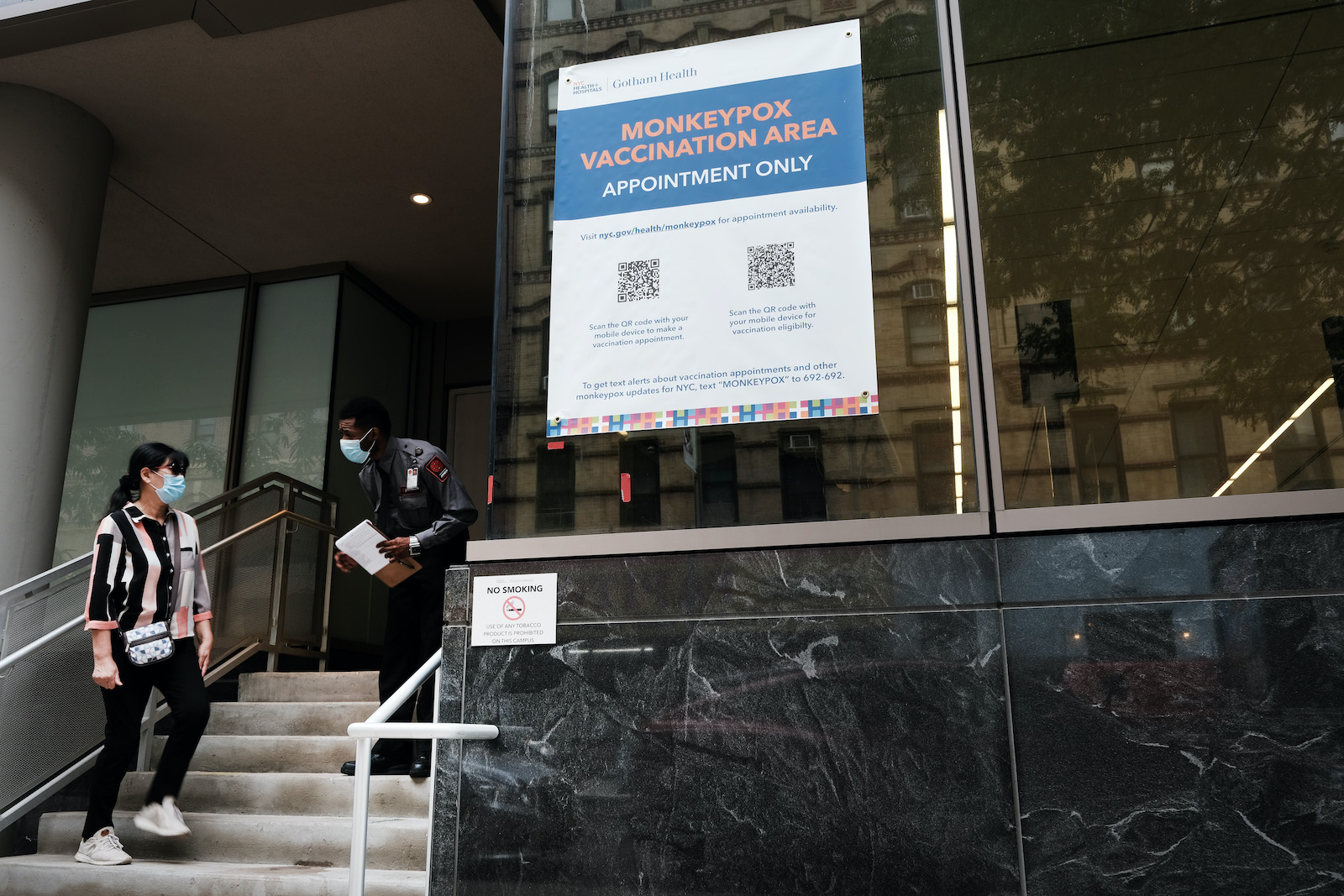
A security guard speaks to people at a health care facility that is administering the monkeypox vaccine by appointment on August 5, 2022, in New York City. Both the World Health Organization and the U.S. administration have declared monkeypox a public health emergency as cases on the rise across the U.S.
Photo: Spencer Platt/Getty Images
The sudden emergence of monkeypox in multiple countries is stress-testing some of the lessons learned during the COVID-19 pandemic. Health institutions seem unprepared to deal with this new health scare, especially one that’s disproportionately seen within a stigmatized minority and involves complicated national security issues around vaccine stockpiles.
Information from health authorities around the world is uneven. As public health officials predict more pandemics in the future, is there a pathway to a more efficient international response?
32,000 Cases So Far
Nurith Aizenman, NPR’s correspondent for Global Health and Development, joined the Altamar team of Peter Schechter and Muni Jensen to talk about the rise of monkeypox. Aizenman said, “Globally, we’re at about 32,000 cases in 89 countries. Virtually all of the cases are in countries that have not historically reported monkeypox. The outbreak is largest in the U.S., with nearly 10,000 cases. It’s followed by Spain with about 5,000. Then you have Germany, France, the U.K. and Brazil with from 3,000 down to 2,000 cases.”
The WHO hesitated to call monkeypox a public health emergency. It eventually did. Did they do the right thing? Aizenman told us, “For the first time, Dr. Ghebreyesus, the head of the WHO, actually broke with his advisory committee in declaring it a public health emergency of international concern. One of the issues around this is that it’s not technically a pandemic at the moment. But there are challenges for which global coordination would be really helpful.”
The Bavarian Nordic Vaccine
We asked about the vaccine availability amid news of shortages, splitting doses, and inequalities in access. Aizenman answered, “In the short term, there is a real shortage of vaccines. Even though technically there are three vaccines that are talked about as useful here, there’s really only one game in town, which is the Jynneos vaccine that’s produced by this Danish company Bavarian Nordic. To the extent that there have been contracts that are publicly disclosed, it does seem to be, once again, really dominated by a handful of wealthy countries led by the U.S.”
In a fractured political globe, there is concern that this new health crisis could add to the divide between the haves and the have-nots. Aizenman agreed, “I think the main thing is just to really be aware and to shine a light as much as possible on both the inequities, which is something that has happened before, and on how the supply is being deployed. Is it rational? Does it match what the world needs?”
Could Become an Issue on College Campuses
Monkeypox is not an STD, but so far it has largely been seen in men who have sex with men. Altamar asked what is known about its spread outside of that initial group. Aizenman said, “It does seem like sex and particularly anal sex is the much more effective way to spread it than other means. Once it entered sexual networks of men who have sex with men, it was really able to gain this current foothold. In the fall, it’s possible that monkeypox will become more of an issue on college campuses as students return. The virus might start to spread at different rates within different demographics.”
Imagination to think of the worst and take the worst case seriously. It requires the stomach to know that you might say the sky is falling and be wrong.
Health institutions have done a poor job of clearly communicating information about transmission, vaccine access, and care for this disease. But international media outlets have largely picked up the slack.
Better Public Messaging
Altamar’s Peter Schechter asked, “Is there a way to create some coherent public messaging around monkeypox?” Aizenman advised, “keeping it simple and treading this line between avoiding stigmatizing groups, but also not being squeamish about talking about the forms of sexual transmission, because people need to know this information. It’s important for everyone to just act like grownups and just state the facts.”
If the disease stays largely among men who have sex with men, there is likely to be treatment issues within countries that have criminalized homosexuality. How do you treat a group which is forced to stay hidden?
Aizenman explained one route being discussed: “One model that people are thinking of is HIV/AIDS, which of course doesn’t exclusively affect gay and queer communities, but that was part of it. They stressed the importance of the U.S. role with PEPFAR (United States President’s Emergency Plan for AIDS Relief), and PEPFAR’s presence in a lot of these countries as a way to have a robust response and encourage governments to fill gaps in serving communities that [they] might not be as inclined to focus on.”
Even within countries that are motivated to help, the information seems to be lacking and largely uncoordinated. Altamar’s Muni Jensen asked, “What is the status of monkeypox reporting and a unified vaccination policy?”
Aizenman said, “It’s hard to extract a full picture. When you ask the WHO for certain facts like who is doing vaccination and who has what, they don’t seem to have a dashboard with all the kind of information that you would consider a baseline necessary for monitoring what’s happening. The COVID pandemic underscored the need for more transparency. And unfortunately, this is just reminding us that that issue has not been fully solved.”
The National Security Dimension
There is a reason why some countries, pharmaceutical companies, and international health institutions have been secretive and unwilling to release more information than is absolutely necessary: Monkeypox is closely related to smallpox, a category A pathogen, which are those organisms/biological agents that pose the highest risk to national security and public health.
Aizenman said, “The vaccines in question were really developed and stockpiled with an eye towards national security. Even though smallpox has been eradicated, there’s always this fear that [stockpiles] could be used as a bioweapon or a lab accident. Governments get nervous about sharing that information too widely. So, it’s this extra twist on an already complicated situation.”
Given how rapidly an unknown virus called COVID-19 spread, Aizenmann stresses the importance of having imagination: “Imagination to think of the worst and take the worst case seriously. It requires the stomach to know that you might say the sky is falling and be wrong. That it’s worth it.”






